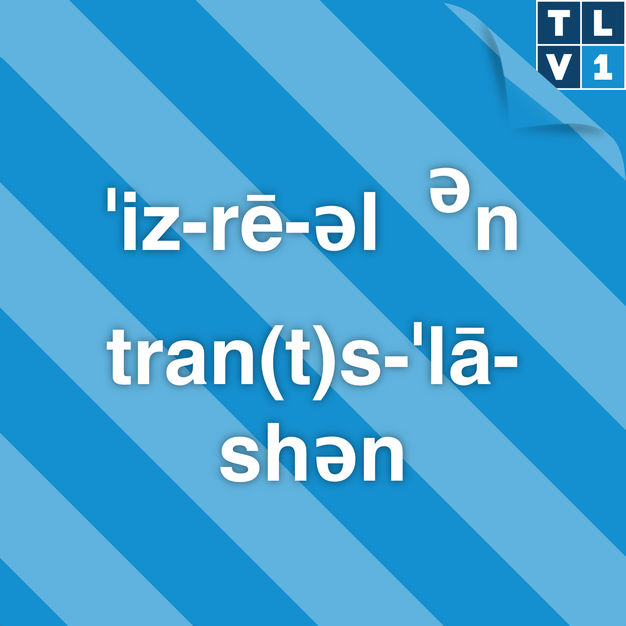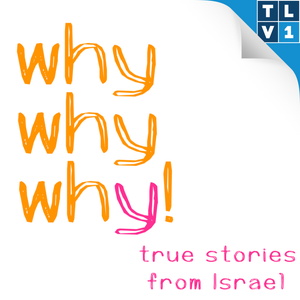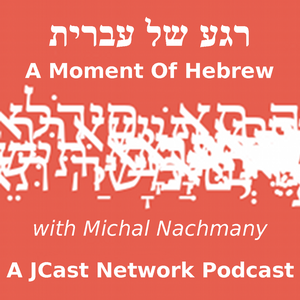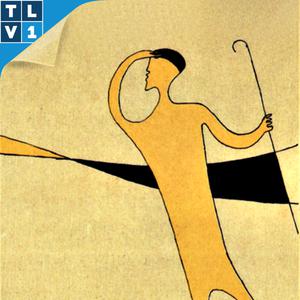
Israel in Translation
TLV1 Radio
Exploring Israeli literature in English translation. Host Marcela Sulak takes you through Israel’s literary countryside, cityscapes, and psychological terrain, and the lives of the people who create it.
- 6 minutes 19 secondsDavid Grossman’s “The Desire to Be Gisella”
In his essay, “The Desire to be Gisella,” Grossman ponders the root of our fear of the “other” in ourselves and in those we love, and he thinks of authorship as a mad rebellion against this fear.
Text
David Grossman, “The Desire to be Gisella.” Writing in the Dark, Essays on Politics and Literature. Translated by Jessica Cohen. Farrar, Straus and Giroux, 2008.
2 June 2021, 11:55 am - 9 minutes 19 secondsDory Manor’s “The Language Beneath the Skin”
This week, Marcela takes a step back from the literature itself to look at the language of the words we use. The idea of the podcast, Israel in Translation, is that the works discussed were written originally in a language other than English—indeed, in the writer’s native language. But one of the realities of our age—or rather—one of the realities of literature—is that often poets and writers do not write in their first language. Or, if they do, this first language is not the language of the culture in which they find themselves.
Marcela revisits the Granta Hebrew issue of the Ilanot Review to talk about Dory Manor’s The Language Beneath the Skin: A Meditation on Poetry and Mother Tongues.
Text
19 May 2021, 5:00 am - 6 minutes 53 secondsJews and Words
In 2014, historian Fania Salzberger Oz, and her father, the late writer Amos Oz, paired up to write a book which is “a nonfiction, speculative, raw, and occasionally playful attempt to say something a bit new on a topic of immense pedigree... the relationship of Jews with words.”
5 May 2021, 5:00 am - 7 minutes 42 secondsMeir Shalev’s “The Blue Mountain”
Set in a rural village prior to the creation of the state of Israel, The Blue Mountain describes a community of eastern European immigrants as they pioneer life in a new land. Narrated by Baruch, a grandson of one of the founding fathers of the village, the novel offers not only a fascinating account of the hardships experienced by the Jewish pioneers, but is also extremely funny and imaginative. It is arranged as a series of vignettes, narrated by Baruch, a mortician, who reflects on the many people he has buried in a remote village.
Text
The Blue Mountain. By Meir shalev. Translated by Hillel Halkin. Cannongate Books, 2001.
21 April 2021, 3:48 pm - 7 minutes 40 secondsThe Poetry of Avot Yeshurun
On this episode, Marcela features the poems of a fascinating writer whose pen name was Avot Yeshurun. He published his first book of poems in 1942, and his last book appeared in 1992, on the day before he died.
Text
“Memories are a House” by Avot Yeshurun. Translated by Leon Weiseltier, Poetry Magazine
“The Son of the Wall” by Avot Yeshurun. Translated by Leon Weiseltier, Poetry Magazine
“The Collection” by Avot Yeshurun. Translated by Harold Schimel, Poetry International Rotterdam
“A Day Shall Come” by Avot Yeshurun, translated by A. Z. Foreman in Poems Found in Translation
7 April 2021, 5:00 am - 8 minutes 43 secondsAyelet Tsabari’s “Savta”
Marcela shares the second installment of a three-part podcast on Ayalet Tsabari’s important and beautiful memoir, The Art of Leaving. Although it was written in English, Tsabari’s native language is Hebrew. This episode gives us a glimpse of Israelis from Yemen, whose stories are so rarely told.
Text
Ayelet Tsabari, The Art of Leaving. Harper Collins, 2019.
24 March 2021, 5:00 am - 7 minutes 28 secondsA. B. Yehoshua’s “The Lover”
On this episode, Marcela highlights The Lover, the first novel by A. B. Yehoshua, which he wrote in 1977. Yehoshua has been called the Israeli Faulkner, perhaps because of this novel. It is narrated from the point of view of each of its six main characters.
Text
The Lover by A. B. Yehoshua. Translated by Philip Simpson. Doubleday & Co., 1978.
https://tlv1.fm/arts-culture/2015/07/22/a-b-yehoshuas-green-seas-and-yellow-continents/
https://tlv1.fm/israel-in-translation/2020/08/12/the-tunnel/
10 March 2021, 5:00 am - 7 minutes 5 secondsMeir Shalev’s “Four Meals”
Meir Shalev has been featured on two previous episodes. Four Meals is his third of eight novels. He’s also published 7 works of nonfiction and 13 children’s books.
Four Meals is the story of Zayde, his enigmatic mother Judith, and her three lovers. When Judith arrives in a small, rural village in Palestine in the early 1930s, three men compete for her. Globerman, the cunning, coarse cattle dealer who loves women, money, and flesh Jacob, owner of hundreds of canaries and host to the four meals which lends the book its narrative structure, and Moshe, a widowed farmer, who gives Zayde his home.
During the four meals, which take place over several decades, Zayde slowly comes to understand why these three men consider him their son and why all three participate in raising him.
Text
Four Meals, by Meir Shalev. Translated by Barbara Harshav, 2000.
https://tlv1.fm/israel-in-translation/2020/07/29/meir-shalevs-my-wild-garden/
24 February 2021, 9:00 am - 5 minutes 46 secondsBatya Gur’s “Murder on a Kibbutz”
On this episode, Marcela revisits Batya Gur, who introduced the murder mystery into Hebrew literature. Gur’s highbrow mysteries are often set in closed communities that mirror issues in the greater Israeli society.
You can hear a previous podcast on her life and literary influence, as well as an excerpt from, Murder in Jerusalem, by following the link below.
Text
Previous Episode on Batya Gur
https://tlv1.fm/arts-culture/2014/10/29/the-israeli-detective-novel-israel-in-translation/
10 February 2021, 5:00 am - 7 minutes 57 secondsAri Shavit’s “My Promised Land”
This book catapulted Ari Shavit into the international spotlight. The book was a New York Times best seller and listed by the Times in its “100 Notable Books of 2013.” The Economist named it as one of the best books of 2013 and it received the Gerrard and Ella Berman Memorial Award in History from the Jewish Book Council. It also won the Natan Book Award.
Text
27 January 2021, 1:01 pm - 6 minutes 44 secondsYaniv Iczkovits’s “The Slaughterman’s Daughter”
On this episode, Marcela reads an excerpt from Yaniv Iczkovits’s novel The Slaughterman’s Daughter: The Avenging of Mende Speismann by the Hand of her Sister Fanny. It is translated from the Hebrew by Orr Sharf.
The protagonist of this book is the titular character, Fanny Keismann, who leaves her home and her wonderful husband, a cheesemaker, and their beloved children, to find her sister’s husband. Adventures and misadventures ensue.
Text
13 January 2021, 5:00 am - More Episodes? Get the App
Your feedback is valuable to us. Should you encounter any bugs, glitches, lack of functionality or other problems, please email us on [email protected] or join Moon.FM Telegram Group where you can talk directly to the dev team who are happy to answer any queries.
 Israel Hour Radio - Israeli Music Podcast
Israel Hour Radio - Israeli Music Podcast
 WhyWhyWhy!
WhyWhyWhy!
 Rega Shel Ivrit (A Moment of Hebrew)
Rega Shel Ivrit (A Moment of Hebrew)
 The Promised Podcast
The Promised Podcast
 Tel Aviv Review
Tel Aviv Review
 Kol Cambridge
Kol Cambridge